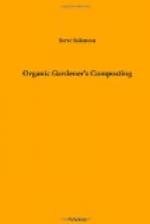Foreword
Back in the ’70’s, I made the momentous move from the East Coast to the West and quickly discovered that much of my garden knowledge needed an update. Seattle’s climate was unlike anything I had experienced in Massachusetts or Ohio or Colorado, and many of my favorite vegetables simply didn’t grow well. A friend steered me to a new seed company, a tiny business called Territorial Seed, unique in that, rather than trying to tout its wares all over the country, it would only sell to people living west of the Cascade Mountains. Every vegetable and cover crop listed had been carefully tested and selected by Steve Solomon for its performance in the maritime Northwest.
The 1980’s saw the revival of regional gardening, a concept once widely accepted, but since lost to the sweeping homogeneity of the ’50s and ’60s. Steve Solomon and his Territorial Seed Company directly influenced the return of regional garden making by creating an awareness of climatic differences and by providing quantities of helpful information specific to this area. Not only could customers order regionally appropriate, flavorful and long-lasting vegetables from the Territorial catalog’s pages, we could also find recipes for cooking unfamiliar ones, as well as recipes for building organic fertilizers of all sorts. Territorial’s catalog offered information about organic or environmentally benign pest and disease controls, seasonal cover crops, composts and mulches, and charts guiding us to optimal planting patterns. Every bit of it was the fruit of Steve Solomon’s work and observation. I cannot begin to calculate the disappointments and losses Steve helped me to avoid, nor the hours of effort he saved for me and countless other regional gardeners. We came to rely on his word, for we found we could; If Steve said this or that would grow in certain conditions, by gum, it would. Better yet, if he didn’t know something, or was uncertain about it, he said so, and asked for our input. Before long, a network of environmentally concerned gardeners had formed around Territorial’s customer base, including several Tilth communities, groups of gardeners concerned with promoting earth stewardship and organic husbandry in both rural and urban settings.
In these days of generalized eco-awareness, it is easy to forget that a few short years ago, home gardeners were among the worst environmental offenders, cheerfully poisoning anything that annoyed them with whatever dreadful chemical that came to hand, unconscious of the long-term effects on fauna and flora, water and soil. Now, thank goodness, many gardeners know that their mandate is to heal the bit of earth in their charge. Composting our home and garden wastes is one of the simplest and most beneficial things we can do, both to cut down the quantity of wastes we produce, and to restore health to the soil we garden upon I can think of no better guide to the principles and techniques of composting than Steve Solomon. Whether you live in an urban condo or farm many acres, you will find in these pages practical, complete and accessible information that serves your needs, served up with the warmth and gentle humor that characterizes everything Steve does.




